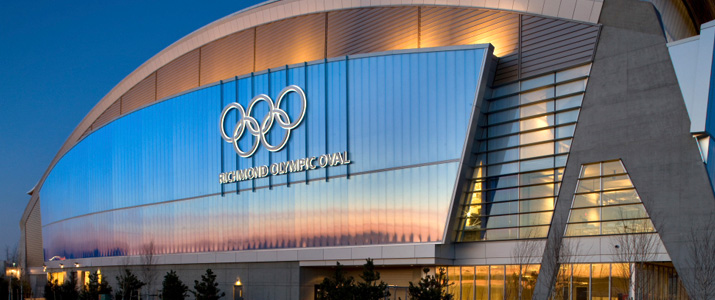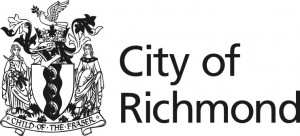Four years after being an official Venue City for the 2010 Olympic Winter Games, the City of Richmond is continuing to realize significant economic, social and cultural legacies, including millions of dollars of new City Centre development.
“The 2010 Games transformed Richmond,” says Mayor Malcolm Brodie. “Richmond’s evolution into a distinct, destination city for tourism and investment was put on a fast track. The incredible social and cultural legacies we gained from being part of the Games have ensured the quality of life in Richmond remains among the highest in Canada.”
Some specific legacies Richmond has gained from the Games:
Richmond Olympic Oval
Universally recognized as the premier venue and legacy of the 2010 Games, the Oval continues to be a post-Games success with more than 3.5 million visitors since its opening. Other highlights include:
- Averaging over 700,000 visits per year.
- · Hosting more than 100 different types of sport and recreation activities since opening.
- · Attracting more than 5,000 active members, 80% of whom are Richmond residents.
- · Hosting more than 20 international, 20 national and dozens of provincial level championships or tournaments. This includes elite level events in more than a dozen summer and winter Olympic and Paralympic sports.
- · Hosting several national centres of excellence in partnership with national sports organizations.
- · Recording a $3.06 million operating surplus in 2012. The Oval has been profitable in every full year of operations since the 2010 Games.
- · Winning more than three dozen awards in areas ranging from architectural design to sustainability
- · Achieving Silver LEED (Leadership in Energy and Environmental Design) certification.
Oval Village Development
The City generated $141 million from the sale of lands adjoining the Oval site. All monies were paid in full at the time of purchase. This sale helped fund a portion of the Oval’s construction costs and establishment of a nearly $100 million reserve fund for future investments. The City used part of this fund to purchase the Garden City Lands, a key parcel of 55-hectares (136-acres) adjoining Richmond’s City Centre, which will become a major new park and community space.
The Oval is at the centre of a rapidly evolving new urban waterfront neighbourhood with numerous new projects underway. Chief of these is River Green, a $1.7 billion, 11.3-hectare (28-acre) master planned upscale neighbourhood that will include more than 2,500 new residential units. First phase of this development is now nearing completion and work is underway on the second phase.
City Centre Development
The completion of the Oval and the $2 billion Canada Line (also an Olympic legacy) accelerated development in Richmond’s City Centre. The construction value of building permits issued in Richmond since 2010 is over $2.3 billion. Overall an estimated $4 billion in new development is underway or proposed just within Richmond’s City Centre alone. Population in Richmond’s City Centre is expected to grow by 50,000 over the next two decades.
Waterfront Development
The City completed the first phase of a new City Centre Park along the Middle Arm of the Fraser River prior to the Games with new outdoor plazas, playgrounds, amphitheatre, and other public amenities along the Middle Arm Greenway. The Middle Arm Greenway was the main pedestrian link to the Oval during the Games. It represents the first phase of what will eventually become a 36-acre waterfront park.
The City’s waterfront network of parks and trails was expanded to include the Riverfront and Legacy plazas at the Oval, which can host events for several thousand participants.
Tourism
More than 500,000 people visited the Richmond O Zone Celebration site during the 2010 Games and 100,000 spectators attended speed skating events at the Oval.
The Games put Richmond on the international map. Olympics created millions of dollars in media exposure. Richmond has built on that exposure to establish a reputation as an international destination of choice for culinary and cultural tourism.
Richmond also launched its award-winning Sport Hosting Program in 2010, which generated more than 23,000 hotel room stays last year. More than 30 national or international level sport championships have been held in Richmond, including the World Masters Badminton Championships and World Wheelchair Rugby Championships. More than 15 elite level events are secured for the next three years including the first TAFISA World Martial Arts Games in September, 2014.
The Richmond Olympic Experience, a major new regional tourism attraction will open at Richmond Olympic Oval in November, 2014. Featuring interactive experiences, multi-media displays and priceless Olympic artefacts from around the world, Richmond Olympic Experience will showcase history Olympics and power of the Olympic spirit, recall the 2010 Games in Richmond and the region and celebrate Richmond’s rich sporting history.
Economic Development
The Metro Vancouver Commerce program brought targeted, international decision-makers to Metro Vancouver for four days of business-to-business activities and technology/capabilities showcase events during the Games. This program generated significant new investment and new jobs across the region including in Richmond. One Richmond company that participated in this program, has grown from five to over 100 employees and was most recently ranked among the top 10 fastest growing companies in Canada.
Volunteer Capacity
About 1,500 volunteers were recruited and screened for City’s Olympic programs, contributing more than 30,000 hours at Games time. Olympic volunteers formed the base for the City’s new volunteer management database, which now has more than 7,300 active volunteers, available to support events and programs of the City and its community partners. Volunteer hours recorded in the City’s volunteer management data base increased by more than by 35% in the past year, as more than 50,000 volunteer hours were recorded.


